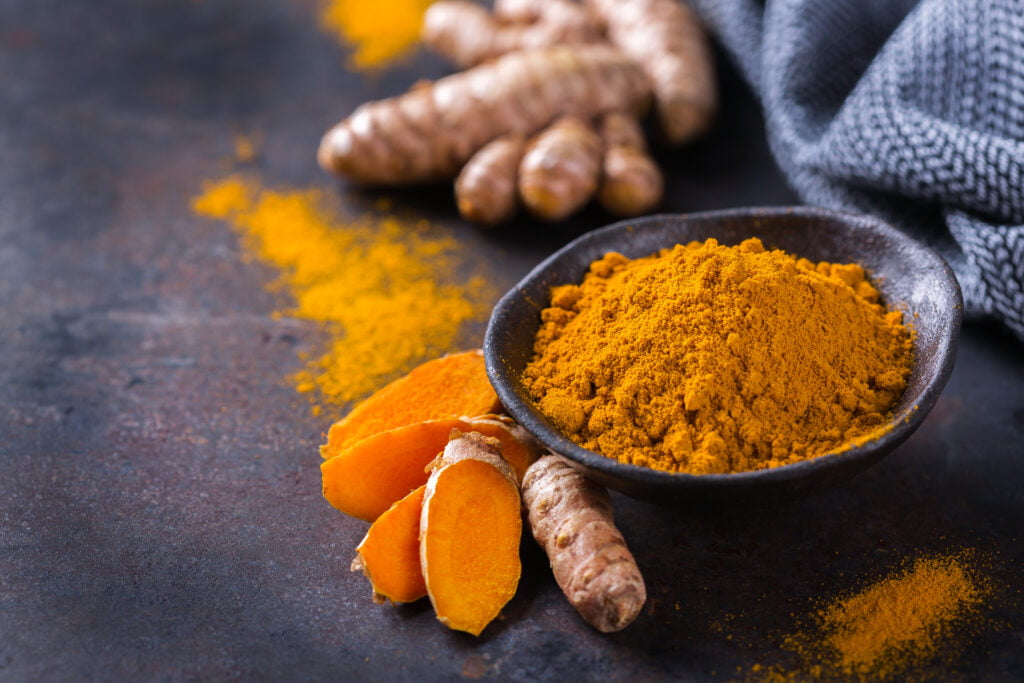Turmeric is Good for All that Ails You
Turmeric has been used for centuries in Chinese and Indian medicine as an anti-inflammatory and natural remedy. Today, modern science is catching up to the age-old tradition of using turmeric to treat a variety of ailments. From stomach problems to joint pain, turmeric is good for so much more than adding flavor to your dishes!
In addition to being an anti-inflammatory agent, studies suggest that curcumin (the active ingredient in turmeric) may also help promote brain health and reduce symptoms of sadness. Curcumin has even been found to have antioxidant properties that can help protect cells from damage caused by environmental toxins or aging. So why not use this ancient wonder herb to live a healthy life?
The bright yellow spice is easy to add into your diet – just add it into your favorite soups or smoothies for a yummy boost!

Turmeric is Good for Reducing Inflammation
Turmeric is a spice that has been used for centuries across cultures. From its bright yellow color to its slightly bitter taste, turmeric is an extremely versatile ingredient. But beyond flavor, recent studies have shown that turmeric can be incredibly helpful in reducing inflammation.
Inflammation is a normal and necessary bodily process; however, when it becomes chronic or long-term, it can lead to serious health issues. Turmeric is packed with antioxidants and anti-inflammatory compounds which help reduce this inflammation. One compound in particular – curcumin – has been found to have particularly powerful effects on the body’s natural inflammatory response system. Studies have shown that consuming curcumin (in the form of turmeric) can help lower markers of inflammation and even help with certain pain-related conditions like arthritis!
How Does Inflammation Affect my Body
Inflammation is an important response of the body’s immune system that helps to protect us from infection and injury. But when inflammation becomes chronic, it can have a negative impact on our overall health. So, what does inflammation do to our bodies, and how can we help to reduce it?
When the immune system detects a threat such as bacteria or viruses, it sends out signals to increase blood flow in order to fight off the intruder. This leads to an increase in temperature and redness at the site of the infection which is called acute inflammation. Chronic inflammation, however, occurs when your body’s natural defenses become overactive and continue sending out these signals even after the threat has been eliminated. This prolonged state of inflammation can cause pain, swelling, and damage to tissues throughout our bodies leading to a variety of illnesses including heart disease, arthritis, diabetes and more.
Acute Inflammation
Acute inflammation is a normal response of the body to an injury or infection. It’s a natural defense mechanism that helps the body heal and protect itself from further harm. When an area becomes inflamed, the tissues swell and become red, warm, and tender — these are all signs of inflammation.
The process of acute inflammation involves several stages. First, white blood cells rush to the affected area to fight off any invading pathogens or repair any damaged tissue. Then, fluid floods in as part of the healing process and can sometimes cause swelling. Finally, other chemicals like histamine are released which can lead to pain and additional symptoms like fever or fatigue.
Chronic Inflammation
Chronic inflammation is a condition that can cause serious health problems and is something to be aware of. It occurs when the body’s natural defensive response to injury or infection—an acute inflammatory reaction—becomes prolonged and persistent. This can lead to damage in the tissues, organs, or systems of the body, leading to a host of uncomfortable symptoms and even disease.
It is important for adults to recognize the signs of chronic inflammation as it can affect different parts of the body. Symptoms vary depending on where in your body inflammation occurs, but may include joint pain, redness or swelling around affected areas, fatigue, loss of appetite, nausea or vomiting. If you have consistent symptoms that last more than three weeks, it’s worth getting checked out by your doctor so they can diagnose any underlying issues that might be causing chronic inflammation.
Turmeric is Good for Boosting Immunity
Turmeric has long been known for its health benefits, not least of all its ability to bolster immunity. This potent spice, native to India and part of the ginger family, is becoming increasingly popular for its anti-inflammatory properties and antioxidant content.
But a lesser-known benefit of turmeric is that it can help fight off infections and illnesses by boosting your body’s natural defenses. The active ingredient in turmeric – curcumin – helps to activate the immune system while simultaneously suppressing inflammation. It’s easy enough to add this super spice into your diet too: try adding a teaspoon or two into smoothies, sprinkle some onto salads or mix with warm water for a homemade drinkable remedy.
Supports Heart Health
Turmeric is known for its variety of health benefits, and heart health is no exception. Studies have shown that turmeric can support heart health in many ways, making it an excellent addition to any diet.
Turmeric contains a compound called curcumin, which is responsible for most of its medicinal properties. Curcumin helps reduce inflammation in the body, improve blood flow, reduce cholesterol levels and lower blood pressure. All of which are essential factors when it comes to heart health. In a study conducted on 40 patients with high cholesterol, researchers found that a daily dose of turmeric powder significantly reduced total and LDL or “bad” cholesterol levels after 3 months.
Benefits for Your Brain
Turmeric is a powerful superfood, and it turns out that it’s good for more than just seasoning your favorite dish. Recent studies show that turmeric can be beneficial to the health of your brain! Here are some ways turmeric can improve your mental wellness.
First of all, turmeric has been found to have anti-inflammatory properties in the brain. This helps reduce inflammation which can lead to conditions like Alzheimer’s or dementia in the long run. It also helps protect neurons from degeneration and damage, so you can keep your cognitive functions sharp and stay alert well into old age.
Another benefit of turmeric is its ability to increase blood flow to the brain. Increased oxygen levels help support better concentration and memory recall, as well as reducing stress levels and promoting relaxation – perfect if you’re feeling overwhelmed or anxious!
Turmeric and Depression
Turmeric is good for depression in particular as it acts as an antidepressant and helps to regulate moods. Depression is a serious condition that affects millions of people all over the world.
The symptoms, including low energy levels and feelings of sadness, can be debilitating and difficult to manage on your own. Fortunately, turmeric may offer some relief from these symptoms! Studies have found that supplementing with curcumin can reduce inflammation related to depression. It also boosts serotonin levels (a neurotransmitter linked to improved mood), and even increase brain-derived neurotrophic factor (BDNF) which plays an important role in regulating moods.
Cognitive Function
Some studies have shown that curcumin may improve cognitive function, especially in the elderly. One study found that this spice was able to reduce oxidative stress and inflammation, which can be a contributor to poor memory and other signs of aging. Another study found that even in patients with mild cognitive impairment (MCI), a precursor to Alzheimer’s disease, turmeric was able to improve their cognitive function.
Neurological Function
Curcumin has been shown to be effective in treating multiple sclerosis and other neurological conditions. It has been shown to be effective at reducing pain and inflammation in multiple sclerosis patients, as well as improving cognitive function.
Turmeric is Good for Digestive Health
Studies have found that taking turmeric supplements can help reduce symptoms associated with gastrointestinal issues, like bloating and stomach cramps. This is because curcumin can help improve digestion. It’s also thought to help increase bile production in the liver which helps break down fatty foods. Turmeric can even help prevent food poisoning by killing off harmful bacteria and fungi due to its antimicrobial properties.
Turmeric is Good for Glowing Skin
If you’re looking for a natural way to make your skin glow, turmeric may just be the answer! Curcumin helps protect your skin from sun damage. This can help reduce dark spots and wrinkles while giving your skin a healthier appearance. It can also improve circulation, which leads to better oxygenation of the skin cells – resulting in brighter, clearer skin.
In addition to its antioxidant and anti-inflammatory benefits, turmeric can help keep acne under control by helping balance oil production and reducing redness from breakouts.
Premenstrual Syndrome
Premenstrual Syndrome (PMS) is a common and uncomfortable condition that affects many women each month. Along with the physical and emotional symptoms, it can be hard to manage. Fortunately, there’s an easy solution – turmeric!
Turmeric has been shown to help relieve PMS symptoms like cramping, bloating, irritability and fatigue. It’s also believed to reduce inflammation related to PMS, which can help ease pain and discomfort. Additionally, turmeric is good for improving moods, balancing hormones and regulating your menstrual cycle.
Irritable Syndrome
If you’ve ever felt the effects of irritable syndrome, you know how difficult it can be to manage. This chronic condition can lead to a lot of physical and mental discomfort, but fortunately there are some natural remedies available. One remedy that has been gaining popularity is turmeric, which is showing promise as an effective treatment for irritable syndrome.
Weight Loss
Research suggests that turmeric may help promote weight loss by increasing thermogenesis (the body’s own rate of burning calories) and reducing fat tissue growth. Additionally, it contains compounds called curcuminoids which help to stimulate the production of bile acid – an important digestive enzyme – and increase the metabolism of fats. This means that when consumed regularly, it can actually speed up your body’s fat burning process.
Adding turmeric to your diet can be a great way to give your weight loss efforts a boost.
Diabetes
Using turmeric in your homemade recipes is a great natural home remedy to lower blood sugar and reverse your insulin resistance. A study from 2009 revealed that curcumin is 400 times more powerful than the common diabetes drug Metformin. This can help people to reverse Type II diabetes. Curcumin was also proven to reverse various matters relating to insulin resistance and hyperglycemia.
Supplementing with Turmeric
There are many forms available such as powder, capsules, and topical creams. Regardless of which form you choose; the key is to make sure you’re getting enough of it on a regular basis to reap the maximum health benefits! While there are no specific dosage recommendations, aim for 2-3 grams per day if taken as a supplement. Add 1-2 tablespoons into your meals when using the powdered form. Adding turmeric to your diet is an easy way to enjoy its various health benefits. Here are some simple ways to add more of this versatile spice into your daily meals.
Firstly, try adding a teaspoon or two of ground turmeric to soups and stews. It can also be used as a seasoning for vegetables or rice dishes. If you’re looking for something with a bit more kick, use the whole root form of turmeric in curries or chutneys. If you prefer sweeter things though, why not try adding turmeric to smoothies?
Turmeric creams are becoming increasingly popular as people discover their benefits for a number of skin issues. Turmeric is known to be good for reducing redness and irritation, calming inflammation, and even lightening dark spots. It also helps to even out complexions and provides deep hydration.
How to Store Turmeric
While turmeric is good for you, proper storage of it can be tricky. The best way to keep turmeric fresh and flavorful is to store it in an airtight container or bag in a cool, dry place like your pantry or cabinet. You can also store it in the refrigerator if you don’t plan on using it right away. If you buy ground turmeric, make sure to use it within three months; whole turmeric root will last up to a year when stored properly.
Side Effects of Turmeric
Side effects of turmeric can include nausea, diarrhea, and indigestion when taken in large doses. In rare cases more serious side effects like liver damage have been reported. For those who are pregnant or breastfeeding extra caution should be taken when considering taking turmeric supplements as there is not enough research to determine how safe it could be during these times.
Turmeric may also interfere with the effects or actions of anticoagulants, aspirin, clopidogrel, and other high blood pressure medicines. Turmeric has an interaction with nonsteroidal anti-inflammatory medications, such as turmeric. If you are taking any of these and other supplements and drugs, use turmeric as your doctor or health professional directs.
Always consult your doctor before taking any dietary supplements and be sure to follow the directions on the label.
Final Thoughts
Turmeric has been used for centuries in various forms of traditional medicine and is still widely used today. It’s known for its numerous health benefits, including anti-inflammatory properties and antioxidant activity. But how good is turmeric really for you? Here are our final thoughts on the matter.
Turmeric is an incredibly powerful spice that offers a variety of health benefits, from reducing inflammation to boosting immunity. Studies have shown it can be especially beneficial when taken as part of a balanced diet or as a supplement. It also helps reduce the risk of certain diseases, such as heart disease and cancer, although more research needs to be done in this area. In addition, turmeric has been found to improve digestion and improve skin health when taken orally or applied topically.






One Comment
Pingback: